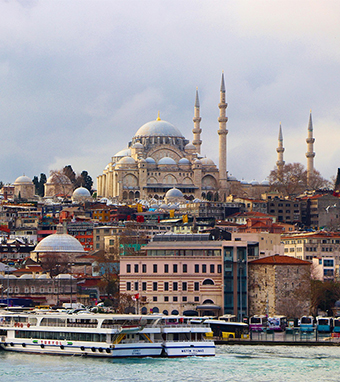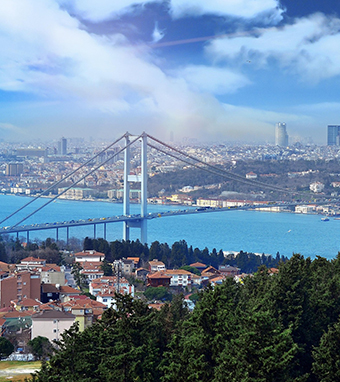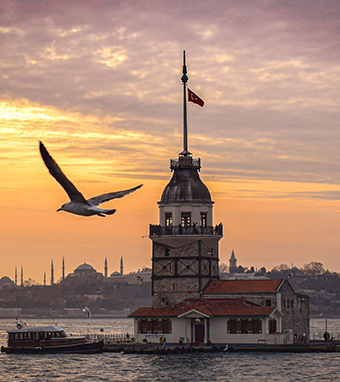
Turkey is a unique country that connects Europe and Asia, offering a blend of Eastern and Western cultures. With its rich history, beautiful landscapes, and dynamic cities like Istanbul, Ankara, and Izmir, Turkey is not only a top travel destination but also a rising hub for international education.
• Top universities like Hacettepe, Istanbul University, and Ankara University have strong medical faculties.
• Programs are available in English, and students receive hands-on clinical experience early on.
• Graduates can work internationally or continue their studies abroad.
• Turkey is a major regional economy and a business hub between Europe, Asia, and the Middle East.
• Students gain real-world exposure through internships and business projects.
• Universities like Bogazici, Bilkent, and Koç have partnerships with global companies and schools.
• Engineering is one of the most popular and well-developed fields in Turkish universities.
• Programs in civil, mechanical, electrical, and software engineering are highly regarded.
• Turkey is developing rapidly in technology and infrastructure, giving students a practical learning environment.
• Tech and innovation are growing fast in Turkey, especially in cities like Istanbul and Ankara.
• Many universities offer advanced IT programs in English, with strong research labs.
• Turkey is becoming a tech startup hub, so students have opportunities for internships and jobs.
The average cost of living for students in Turkey can vary significantly depending on the city and lifestyle choices. However, as a general guideline, Turkey is known for being relatively affordable compared to many Western countries. Here’s a breakdown of the typical living costs for students in Turkey:
|
Category |
|
|---|---|
| 1. Housing | |
| • Shared flat or dorm : 100−100 - 100−250/month | |
| 2. Food and Groceries | |
| • Food & Groceries : 100−100 - 100−150/month | |
| 3. Transportation | |
| • Public transport is widely used in Turkish cities and is quite affordable. A monthly transport pass by metro or bus is 10−10 - 10−25. | |
| 4. Miscellaneous Expenses | |
| • This includes mobile phone bills, leisure activities, books, and other study materials. Students might spend approximately 20−20 - 20−45/month on these. | |
| 5. Personal Expenses | |
| • If utilities are not included in the rent, students should budget approximately £40 to £60 per month for gas, electricity, and water. Internet typically costs around £10 to £30 per month. | |
| Overall Monthly Estimate |
The monthly average cost is between 300and300 and 300and500 depending on your lifestyle and city. Smaller cities like Konya, Kayseri, or Erzurum are cheaper, while big cities like Istanbul, Ankara, and Izmir are more expensive, especially for rent.



1. Istanbul
Istanbul is not only Turkey's largest city but also the leading hub for higher education. It's home to several prestigious universities like Koç University, Bo?aziçi University, Istanbul Technical University (ITU), and Istanbul University. These institutions are internationally recognized for their academic excellence, particularly in fields like engineering, business, medicine, and arts. The city's cultural diversity and rich history also make it a great place for students from around the world.
2. Ankara
Ankara, the capital city of Turkey, is home to some of the country’s most respected universities. Middle East Technical University (METU), Bilkent University, and Hacettepe University are all based in Ankara. These universities offer a wide range of programs in fields such as engineering, business, and the social sciences, with METU being particularly renowned for its research and engineering programs. Ankara’s political significance also makes it a dynamic environment for students interested in international relations and public administration.
3. Izmir
Izmir, located on the Aegean coast, is another city with a growing reputation for higher education. Ege University and DokuzEylul University are two major institutions based here, offering diverse programs in science, engineering, arts, and business. The city’s relaxed atmosphere, combined with its university offerings, makes it an attractive destination for students, particularly those who are interested in a coastal, student-friendly lifestyle.
4. Bursa
Bursa is an industrial city that has also made a name for itself in higher education. Uluda? University is one of the largest universities in the region, offering a broad range of programs, from engineering to economics. Bursa’s proximity to Istanbul, as well as its reputation for a quieter, more relaxed lifestyle, makes it an appealing choice for students looking to balance their academic and personal lives.
5. Konya
Konya, while not as large as Istanbul or Ankara, is home to Selçuk University, one of Turkey's largest universities. Known for its strong programs in agriculture, engineering, and humanities, Konya offers a more affordable and quieter student experience. The city’s historical and cultural significance, combined with a growing academic infrastructure, makes it a great place for students seeking a deeper connection with Turkish traditions and culture.
These cities not only offer great universities but also a dynamic atmosphere for international students to grow academically and culturally.